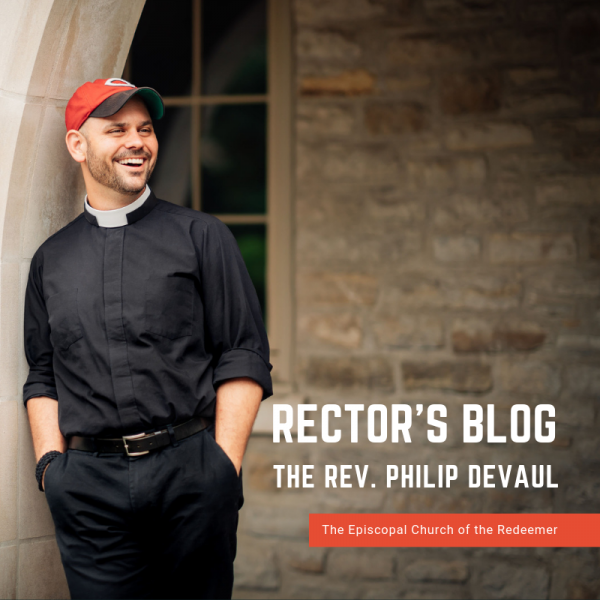Rector's Blog: Rest is a Joke, Right?

The rule of thumb for how long a kid should be in time out is one minute for every year old they are. So, my 6-year-old goes to time out for 6 minutes, and my 9-year-old goes to time out for 9 minutes, and so on. They are horrified by this, you know: Having to sit and do nothing and be quiet for 6 or 9 whole minutes is a crushing defeat, cruel and unusual punishment.
I’m 40 years old. Do you know how much I would love if someone told me I had to go be by myself and not talk to anyone for 40 whole minutes? 40 minutes! Put me in time out. Please. I read something recently that said, “Going to bed early, not leaving the house, not going to a party: My childhood punishments have become my adult goals."
Rest is a joke, right?
I talk about it like it is, or I talk about rest in passing, like it’s a dream vacation or a winning lottery ticket. Getting rest. I talk about a healthy amount of sleep or the possibility of downtime – not just time for hobbies, but time doing nothing – hypothetically, not practically. I wouldn’t dare put rest on my Bucket List, because I have no interest in achieving it before I die.
Did you know that putting a kid in time out is not actually supposed to be punitive? No, seriously: the point of time out is not supposed to be to bore a child to death, or even to give them an opportunity to feel bad. Time out works under the assumption that when a young person misbehaves or acts out, setting apart a space where they can breathe and calm down will help them feel better and make better choices. Time out is meant to give them a better perspective.
When you think about it this way, it’s odd that we consider taking time out to breathe and reset a punishment. I joked earlier about wanting to be in time out, but what’s stopping me?
Let’s acknowledge something about God: God says rest is central to our identity. It’s not just that rest is important or meaningful or “good” or “right” – it’s that God places rest right in the center of our lives. We are not just commanded to rest (although, we are commanded repeatedly and emphatically), we are meant, at least in part, to be defined by it.
A whole day of rest every week was so intrinsic to the Jewish self-understanding in Jesus’ time, that when Jesus did things that were seen as violating the Sabbath, he wasn’t just breaking an arbitrary rule, he was attacking the very heart of his people’s identity. Christians tend to minimize that today or think that Jesus somehow diminished the importance of rest with his actions. Jesus broke the Sabbath, so it’s not important, right? We’ve got to know that every time Jesus “broke” a commandment, he did so with great care – and for the purpose of helping us get to the heart of that command – not to prove them meaningless.
Jesus didn’t show up so you could have an excuse not to rest. Jesus didn’t break the Sabbath to prove rest isn’t important. Rest is still meant to be a defining characteristic of your life with God. Let me say that again: Rest is meant to be a defining characteristic of your life with God.
So, what’s stopping me from resting?
Myself mostly. My ambition and insecurity, my fear of what will happen if I stop. Really, I’m not all that different from my 6-year-old. I’d like to pretend I want a time out, but when I’m forced to stop and do nothing, I take it like a punishment – I don’t know what to make of it. But I can talk with my therapist about all that. Here’s what I want to imagine today: I want to imagine what it would be like if I understood rest as a defining characteristic of my life. I want to take God seriously.
I don’t want to read (or write) another think-piece about how busy and tired our culture is and how we commodify our lives and blah blah blah. I don’t want to indulge in shame over my lack of rest. That sounds exhausting.
I want to reorient myself around God’s sense of rest. I want to think creatively and joyfully about what that would look like. I want to put rest on my Bucket List. And I want for you and me to talk about it with each other. To invite each other into rest. I want us to brag about it with each other – brag about our own periodic uselessness and self-imposed time-outs. And I don’t want to do this so I can be a good person or a better person or the right kind of person.
I want to make rest a central part of my life because I want the chance to see myself the way God sees me.